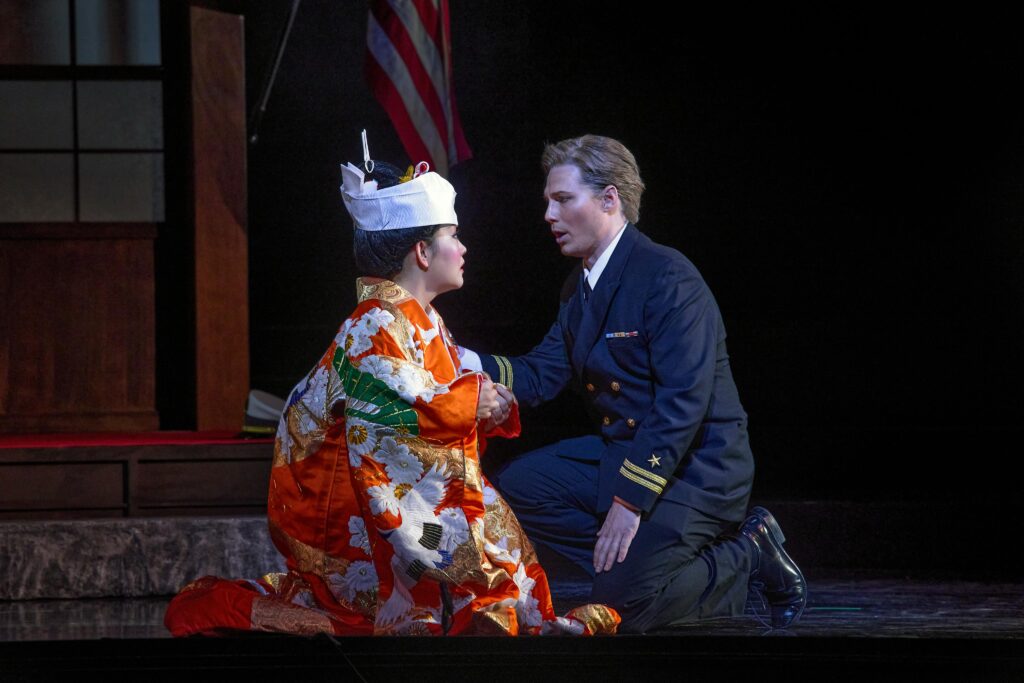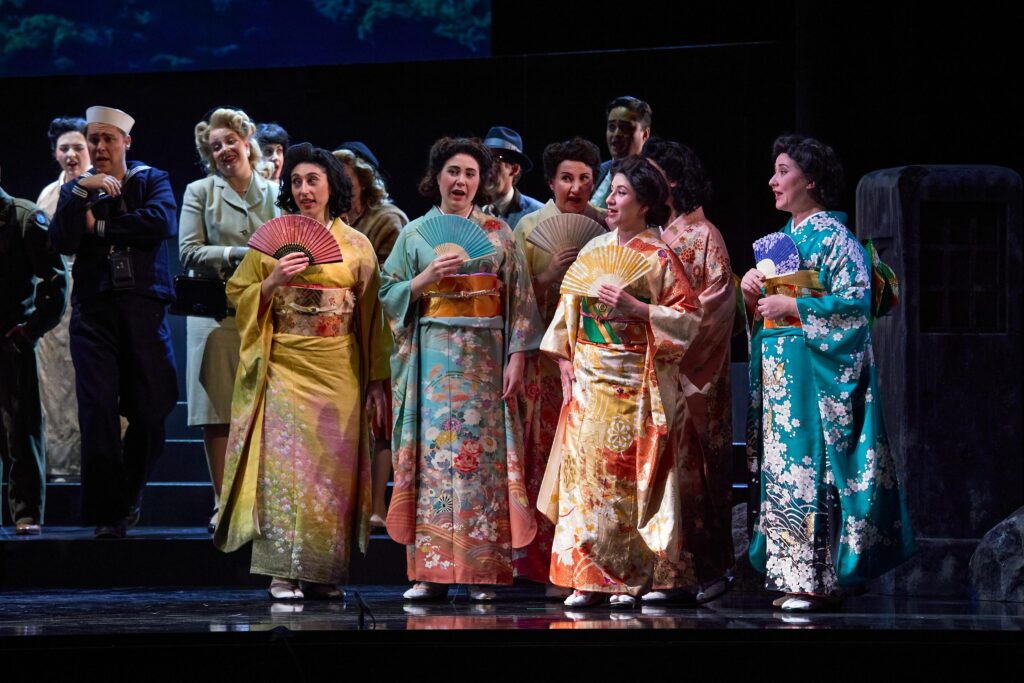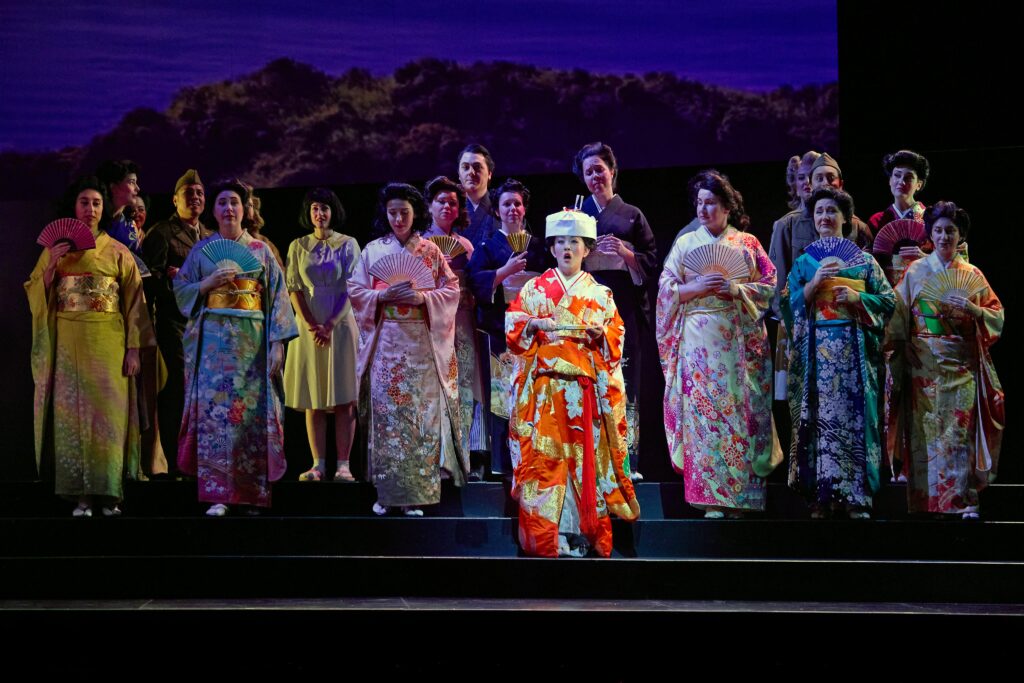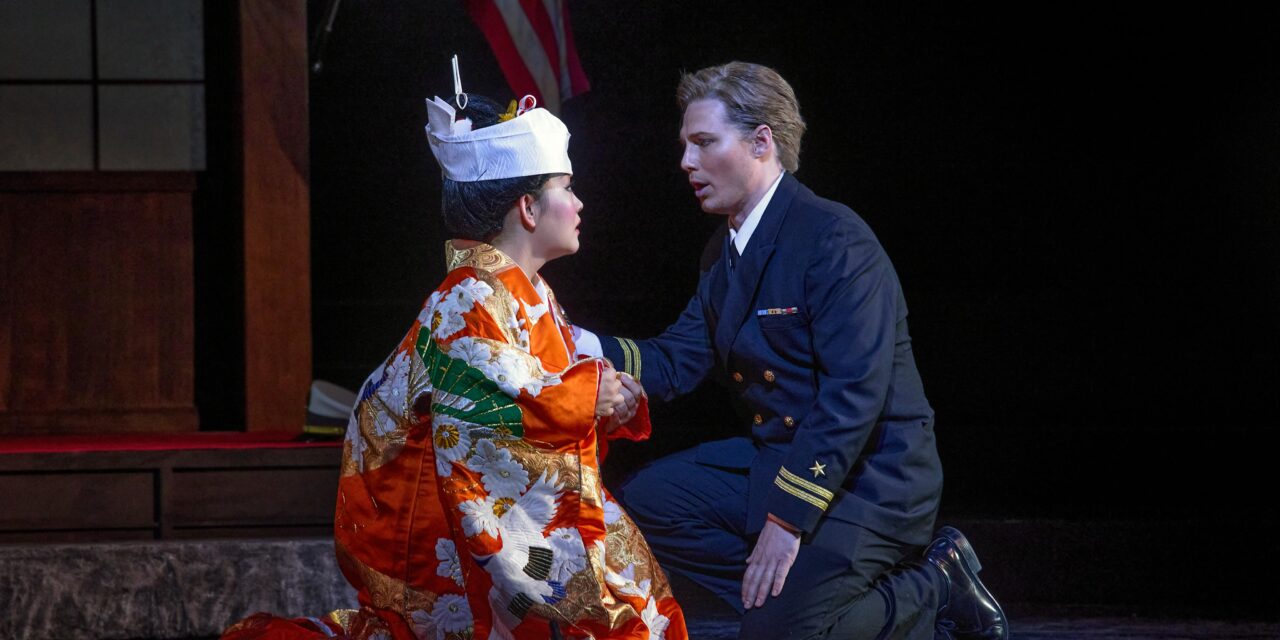
Review by Mark Morris
Puccini: Madama Butterfly
Director – Mo Zhou
Lighting Designer – Marie Yokoyama
Costume Designer – Mariko Ohigashi
Set Designer – Chika Shimizu
Cio-Cio-San – Yasko Sato
Pinkerton – Matthew White
Suzuki – Nina Yoshida Nelsen
Sharpless – Phillip Addis
Goro – Julius Ahn
Uncle Bonze – Stephano Park
Yamadori/Imperial Commissioner – Luka Kawabata
Kate Pinkerton – Alessia Vitali
Calgary Philharmonic
conducted by Jonathan Brandani
Southern Alberta Jubilee Auditorium
Friday, November 7, 2025
If you wanted to see what could be done by a provincial Canadian opera company to breath new life into an old opera warhorse, while maintaining and honouring the traditions of that opera, you needed to go no further than to the Jubilee in Calgary in the first week of November.
There you would have seen Calgary Opera’s new production of Puccini’s Madama Butterfly, co-produced with Arizona Opera and Opera Grand Rapids. There were no superstar names, but a consistently solid ensemble cast, a visually effective set, excellent stage direction, and supportive conducting from Jonathan Brandani and playing by the Calgary Philharmonic. Above all, there was a compelling concept that made one rethink the opera without in any fashion dishonouring it, as such re-imaginings so often can.
Madama Butterfly, with its story of an American naval officer marrying and then abandoning a Japanese ex-geisha, these days can seem problematic. Puccini’s librettists Luigi Illica and Giuseppe Giacosa toned down the more racist overtones of David Belasco’s 1900 play, but the story is, underneath, totally exploitive. Add to that Puccini’s fascination with fallen and oppressed women (Cio-Cio San is, after all, a Japanese analogue of Suor Angelica), and the opera can be uncomfortable, however much – or because – it is a tear-jerker.
Chinese-born director Mo Zhou’s masterstroke was to set the opera immediately after the Second World War, in occupied Japan, without changing any of the text. Although it is not acknowledged in Calgary Opera’s program booklet, this seems to have been inspired by the Smithsonian’s touring exhibition ‘Japanese War Brides: Across A Wide Divide’, which started touring the States in late 2004, and will continue to do so through Summer 2028. As the Smithsonian says, “Nearly 45,000 Japanese women emigrated to America as wives of U.S. military service members after World War II…Their arrival marked the largest women-only immigration event in U.S. history and, by 1960, had increased the population of Asian Americans in the U.S. by 10%.”
Inevitably, and especially as the production keeps the original setting of Nagasaki, the shadow of the atomic bombs haunts this retelling, never mentioned but always in the back of the mind. The concept of the war bride, and of occupying troops fathering children with local women and then abandoning them, fits the opera totally naturally, and is reinforced by the presence of some American soldiers with their Japanese girlfriends in the chorus. And the resonances didn’t stop there – one thought of the Americans in Vietnam, and the kind of bullying and foreign exploitation that the Trump regime seems so much to enjoy today.

The production quotes from the exhibition using surtitles during the Intermezzo – the only time, I felt, that the considerable cohesion of the production faltered, as this became (unnecessarily) a didactic moment, instead of an artistic one.
The set, designed by New-York based Chika Shimizu might be described as photo-realistic: a simple Japanese house stage right, where sliding doors opened up interiors, and a vivid backdrop of the sea and islands. It was beautifully lit by New York based Japanese lighting designer Marie Yokoyama, with the backdrop very slowly changing light with the time of day.
One of the pleasures of this cast was its overall quality, all strong voices well capable of filling the cavernous Jubilee. Japanese soprano Yasko Sato has sung the title role with a number of North American companies, and was ideal for Zhou’s concept. Her Cio-Cio-San was no mere naive young woman, passively being destroyed by a callous interloper. In the second act in particular, she was feisty, at times commanding, both vocally and dramatically. Her immersion in adopting an American culture, in spite of family disapproval, came across as much a powerful motive as her love for Pinkerton.
Little details in Zhou’s direction reinforced her interpretation, such as Cio-Cio-San’s son (played with remarkable stage presence by Nela Pilecki) having a Mickey Mouse stuffed toy, or the stunning reveal of her wedding kimono, hung like a cross as she knelt to commit suicide. Perhaps most telling of all was Cio-Cio San laying down the Christian cross on her dressing table when she learns the truth – one realized that the deepest hurt was that the culture and religion she had adopted had failed her.
She was supported by a uniformly strong cast. American tenor Matthew White, in fine voice, came across as a witless if attractive Pinkerton, his American sense of superiority too inbred for self-reflection until near the end, when – too late – he had just an inkling of realization of what he had done. Again, this was ideal ideal for the overall shape of the production. Julius Ahn (Goro), Stephano Park (Uncle Bonze) and Luka Kawabata (Yamadori) all avoided the inherent pitfalls in the opera of appearing as caricatures – indeed, one felt sorry for the spurned Yamadori, his dignity all too clear.
Phillip Addis, who has been such a mainstay in Alberta productions in the last year or so (Don Pasquale, Gianni Schicchi, Don Giovanni, Silence) was especially effective vocally and dramatically as the US consul Sharpless, creating a character whose values and respect for the culture harked back to a different era – there must be a number of Sharplesses in US embassies around the world today, deeply troubled by the US’s current attitudes to all foreigners, but powerless to change them.

This was one of those opera productions where there were no superstars, but a strong cast and company, all committed to a central directorial concept, and where the whole was greater than the sum of its already fine parts. It could not have come at a more apposite time, as Trump orders his embassies to declare that countries countries enforcing race or gender diversity, equity and inclusion (DEI) policies (which includes Canada) will now be considered to be “infringing human rights”. The American bully boys are back, led by a President who has been found liable by a civil US court jury for sexually abusing a woman.
Finally, it was so gratifying to see the Jubilee absolutely jam-packed – opera is alive and well in Calgary, and one can only wish Edmonton Opera could match what is happening in the southern city, and produce productions of such social import and commentary as this memorable Madama Butterfly.


